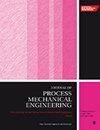Irreversibility analysis on a radiative hybrid nanofluid flow across an exponentially stretching sheet with multiple slips and variable thermal conductivity
IF 2.2
4区 工程技术
Q2 ENGINEERING, MECHANICAL
Proceedings of the Institution of Mechanical Engineers, Part E: Journal of Process Mechanical Engineering
Pub Date : 2024-09-04
DOI:10.1177/09544089241276350
引用次数: 0
Abstract
The entropy analysis and flow behavior of a mixed convective hybrid nanofluid [Formula: see text] across an exponentially stretching sheet were examined in this article using Tiwari-Das model in presence of thermal radiation, Joule heating, viscous dissipation, velocity slip, and thermal slip at the boundary with the idea of variable thermal conductivity which was yet to be studied by any researcher. This attests to the novelty of our study. The non-linear partial differential equations have been transformed into non-dimensional ordinary differential equations using similarity transformations, and the MATLAB bvp4c algorithm is used to solve it numerically. Comparisons were made with previously published studies which were found to be in great agreement. The temperature profile increases with increasing Eckert number [Formula: see text], variable thermal conductivity parameter [Formula: see text], buoyancy parameter [Formula: see text], volume fraction of nanoparticle parameter [Formula: see text], and radiation parameter [Formula: see text]. However, the opposite trend is observed when suction parameter [Formula: see text] is increased. It was observed that the fluid motion decreases as velocity slip [Formula: see text] increases and thermal slip [Formula: see text] behaves in the same manner on temperature profile. It is observed that, for differing values of Eckert number and radiation parameter, the skin friction coefficient leads to increase while the Nusselt number values decrease. An increased by 9.39% is observed for entropy production [Formula: see text] for a change in Brinkmann number [Formula: see text] from 0.5 to 2.0 while entropy production profile reduced by [Formula: see text] for changing the variable thermal conductivity parameter from [Formula: see text] to 1.5. Similarly, an increased by [Formula: see text] is observed for temperature profile for a change in radiation parameter from Rd = 0.10 to 1.50. The current study discovered use for it in glass fiber production, wire drawing stretching, aerodynamic plastic sheet extrusion, metallic plate cooling, etc.具有多重滑移和可变导热性的指数拉伸薄片上辐射混合纳米流体流动的不可逆性分析
本文使用 Tiwari-Das 模型,在热辐射、焦耳热、粘性耗散、速度滑移和边界热滑移的情况下,研究了混合对流混合纳米流体[公式:见正文]在指数拉伸薄片上的熵分析和流动行为。这证明了我们研究的新颖性。利用相似变换将非线性偏微分方程转换为非二维常微分方程,并使用 MATLAB bvp4c 算法进行数值求解。与之前发表的研究结果进行了比较,发现两者非常一致。温度曲线随着埃克特数[计算公式:见正文]、可变热导率参数[计算公式:见正文]、浮力参数[计算公式:见正文]、纳米粒子体积分数参数[计算公式:见正文]和辐射参数[计算公式:见正文]的增加而增加。然而,当吸力参数[计算公式:见正文]增大时,观察到了相反的趋势。据观察,随着速度滑移[计算公式:见正文]的增加,流体运动减小,而热滑移[计算公式:见正文]在温度曲线上的表现相同。据观察,在埃克特数和辐射参数值不同的情况下,表皮摩擦系数会增大,而努塞尔特数值会减小。当布林克曼数[计算公式:见正文]从 0.5 变为 2.0 时,熵产生[计算公式:见正文]增加了 9.39%,而当可变导热参数从[计算公式:见正文]变为 1.5 时,熵产生曲线减少了[计算公式:见正文]。同样,当辐射参数从 Rd = 0.10 变为 1.50 时,温度曲线也会增加[公式:见正文]。目前的研究发现它可用于玻璃纤维生产、拉丝拉伸、空气动力塑料板挤出、金属板冷却等。
本文章由计算机程序翻译,如有差异,请以英文原文为准。
求助全文
约1分钟内获得全文
求助全文
来源期刊
CiteScore
3.80
自引率
16.70%
发文量
370
审稿时长
6 months
期刊介绍:
The Journal of Process Mechanical Engineering publishes high-quality, peer-reviewed papers covering a broad area of mechanical engineering activities associated with the design and operation of process equipment.

 求助内容:
求助内容: 应助结果提醒方式:
应助结果提醒方式:


